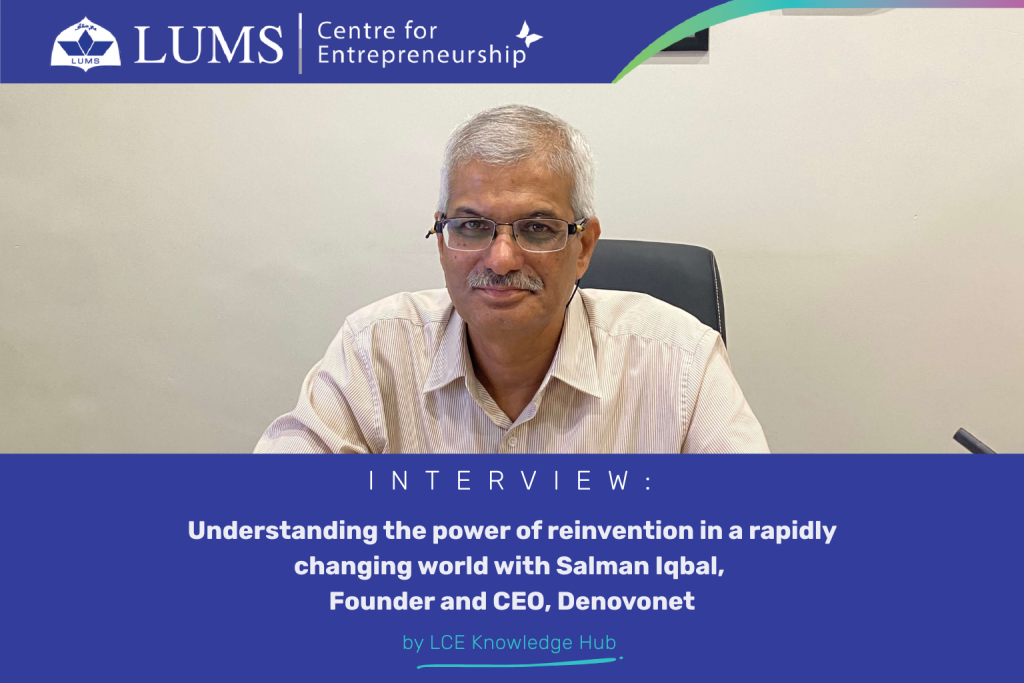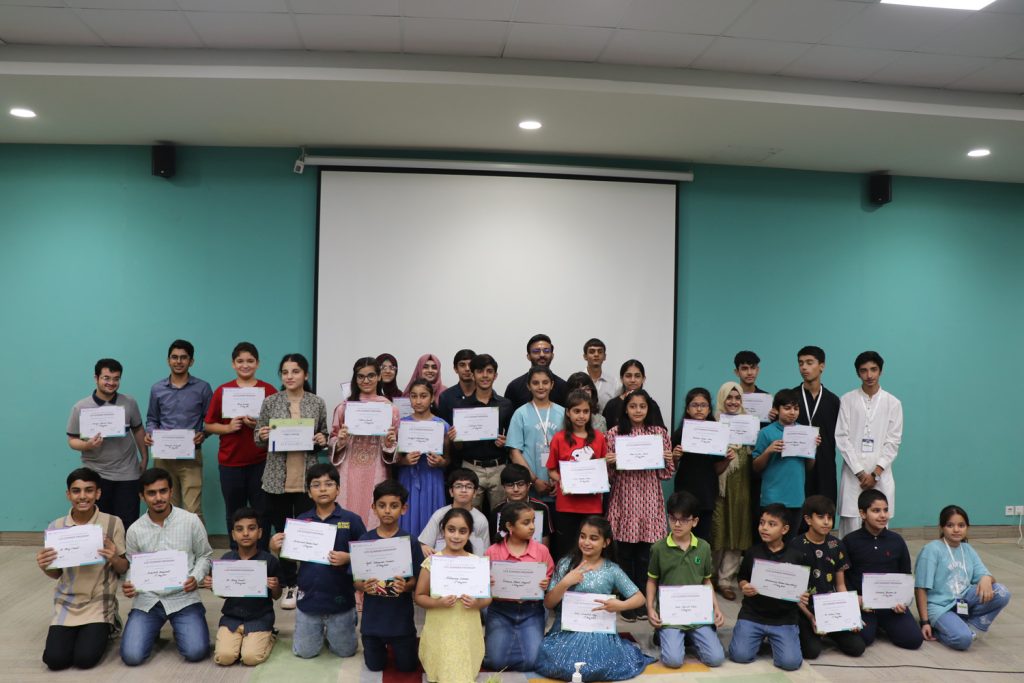Interview by Sameen Mohsin
“Change is the only constant” – this is a phrase Salman Iqbal doesn’t just say in conversation; it’s a statement he embodies. Two years ago, Mr. Iqbal exited from a company he took 25 years to build from the ground up, not to rest or retire, but to build another company from scratch, this time within a completely new technology landscape. His tenacity and courage to continue reinventing himself to build start-ups and products that have a deep business impact for his clients is something that has the power to inspire a whole generation of entrepreneurs navigating the current landscape.
Mr. Iqbal’s Denovonet is currently housed at LCE and develops advanced, next-generation solutions leveraging Artificial Intelligence and Machine Learning technologies to enhance transaction monitoring processes for financial institutions.
We sat down with him to hear about his entrepreneurial journey and get his perspective on the new technologies he’s working with, as well as the mindset required to keep growing as a start-up founder.
Q — You started your career as an electrical engineer. Could you tell us more about your transition from pursuing a PhD in Electrical Engineering to become a founder of your own software company?
A — I got the opportunity to work in capital and financial markets, which was a complete 180-degree flip, because I was an electrical engineer by profession, with my undergraduate and PhD completely focused on tech. There was not an iota of learning towards business during my academics. But I wanted to do something completely different. I wanted to stay in Pakistan and contribute here.
Three years into doing a job focused on automating capital markets in Pakistan, our team accomplished some major objectives: replacing the manual trading floor with fully screen-based trading country-wide and contributing towards an electronic share depository, and developing a unified national clearing and settlement system. Most of the targets were accomplished, at least whatever I thought I would like to do, I had done. Teams were trained, and a very capable team was left behind to continue the progression. I thought that now was the time; I’ve got a good understanding of the financial sector, current business needs, and pain areas to design solutions that make their processes more capable and efficient. We deep dived, took measured risks and started a business venture. I had some investors on board so I started Softech Systems in 1998, which was the beginning of my 25-year journey building the company.
Q — You worked with a lot of international clients while leading Softech Systems, what was that experience like?
A — We were fortunate to work with some leading players in the tech industry. Early on, we had the opportunity to work as development partners with EFA Software Services, based in Calgary, Alberta, which developed capital market solutions. Our exposure to the Canadian market led to more breakthroughs, the most exciting being our partnership with Concept Wave, a Toronto-based company that developed and marketed product care and order catalogue solutions for leading telecom operators globally. Softech was fortunate to convince them of our ability to be their partners in development and implementation worldwide. We completed numerous implementations across several continents for leading telecom providers. The company was sold to Ericsson, the world’s leading telecom provider, and we continued working with them as well.
During our decade-long partnership with Ericsson, we collaborated on and implemented many solutions with some of the most prestigious telecom providers worldwide. Notable implementations include Turk Tel (Turkey), Ziggo (Holland), BMW (Munich), Hutchison (Hong Kong), Thai Tel (Bangkok), STC (Saudi Arabia), and Etisalat (Dubai). Most of this work was achieved through relationship building and personal networking. As pilots succeeded, we received larger and more challenging projects, strengthening our relationship with Ericsson. Additionally, we are very proud to have developed Pakistan and Ghana’s National Clearing and Settlement System. We also designed solutions in brokerage, online trading, and asset management sectors, which operate across many continents. Our teams got massive exposure working across different cultures and in so many different domains.
Q — You could have easily retired after exiting Softech Systems, why did you choose to go through the challenge of starting another company from scratch?
A — I dedicated 25 years to a company, driving its growth, delivering strong returns to investors, and achieving significant personal success. However, there came a point when the work began to feel static, repetitive motions without the momentum of new possibilities. Rather than continually trying to convince stakeholders to embrace a fresh vision, I decided to start with a clean slate. Having already explored various ventures in my entrepreneurial journey, I understood the challenges of building something from the ground up, but I was equally aware of the rewards in the form of personal nurturing, knowledge growth, and substantial upside if it succeeded.
Q — How is Denovonet positioned to help companies leverage AI/ML effectively?
A — Initially, our focus was on learning and experimentation, taking existing solutions and enhancing legacy systems with Artificial Intelligence and Machine Learning to make them more effective and productive. Today, our goal is to help businesses unlock the full potential of their data through AI, machine learning, and advanced analytics. We aim to transform complex data into actionable insights that drive smarter decisions, greater efficiency, and stronger returns. This means embedding intelligent technologies into everyday operations and fostering a data-driven culture that delivers lasting value. At present, we are developing high-accuracy anomaly detection for financial transactions, combining advanced rule-based methods with machine learning to provide deeper insights and better process efficiency reducing manual interventions.
Q — In your opinion how has AI changed the future of work and are current graduates equipped for this new landscape?
A — The future of work is changing in real, tangible ways—it’s not just speculation. We either learn and adapt to these new technologies, or we risk being left behind. The traditional approach to software development is fading fast. Much of the code that used to be written by software engineers is now being generated by AI, and the few gaps the technology has today will inevitably be closed shortly. This shift is transforming the job landscape: some roles will become obsolete, but entirely new opportunities will also emerge, provided we have the skills to seize them.
Take, for example, the role of prompt engineer—a job title that didn’t exist until recently. Its emergence signals how deeply companies intend to integrate AI into their operations. And it’s not just a “tech job.” A prompt engineer needs strong domain expertise as well. If the task is to generate financial models, you need a solid background in finance, not just technical know-how.
Unfortunately, most of our graduates are not ready for this multidimensional future of work. A few are, but often because they’ve taken the initiative to upskill themselves. In many universities, faculty members remain comfortable teaching outdated knowledge. As a result, graduates enter the job market with skills that are out of sync with the demands of emerging roles. To close this gap, both curricula and faculty training must be updated through targeted initiatives and national-level programs to prepare our workforce for the realities of tomorrow.
Q — How can the government and other stakeholders support AI adoption in the country?
A — The security implications of this technology are substantial. When dealing with data, particularly sensitive personal information such as health records or travel schedules, privacy concerns become paramount. This is why governments and organizations must prioritize the introduction of robust regulations, such as comprehensive data protection laws, to ensure that individuals feel confident their information will be used solely for its intended purpose and not shared with marketers or other unauthorized parties. Clear regulations, laws, and enforcement procedures are critical, and this remains a global challenge.
Another urgent issue is the need to tackle data bias. Many AI systems inherit biases from the data they are trained on, which can lead to discriminatory results. To prevent this, regulations must include measures to identify and remove bias, making sure that technology does not marginalize or demean specific communities. This might involve masking certain parameters and implementing practices that keep datasets as neutral and representative as possible.
Q — What advice would you give to entrepreneurs navigating today’s fast-changing landscape?
A — First, acknowledge that this technology is here to stay. Every organization ultimately exists to serve customers and drive sales, and if an AI-first solution proves more cost-effective and capable than a traditional one, consumers will choose it. Human intuition, while valuable, is limited compared to what AI can achieve with data. Traditional methods have their limits; to truly understand customers, AI and machine learning can uncover patterns and trends hidden within the data you already possess.
This represents a fundamental shift—AI agents are beginning to replace many traditional SaaS models. That change cannot be stopped, so it must be embraced. Re-educate yourself, stay informed, and be open to learning from those around you. Recognize your gaps and bring in the right expertise to realize your vision. You may have the domain knowledge and strategic insight, while others contribute deep technical skills. Together, you can create solutions that are not only relevant today but also resilient and competitive in the future.


